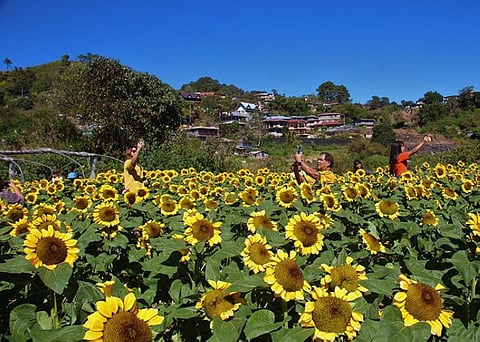

LA TRINIDAD, Benguet -- Amid the pandemic, Ligaya Pumihic Zolina, 31, of the Heaven scent flower shop in Manila, and their farms in Barangay Alno, La Trinidad, Benguet continue to maintain their flower farms with his siblings.
"I told my siblings to continue to water, spray, clean the farm but also forbear with the expense even without income. This February is a hint of hope that we will be able to sell and earn, to buy food and repay debts," Zolina said in the local dialect.
With the low sales of flowers during the pandemic, they were able to keep up with the expenses through loan in the bank.
Zolina said Anthuriums were in demand compared to roses during the pandemic.
With the imposition of enhanced community quarantine in the whole country starting March 2020 because of the threat of Covid-19, events, mass celebrations, and gatherings were prohibited and flowers for these occasions weren't in demand.
It was only in June when the community quarantine and restrictions started to be eased.
For those in the cutflower industry, they hope that occasions such as this year's Valentine's Day will help them recover their losses.
Flowers bloom
As flowers slowly find their way back to the market, Belmer Elis,
barangay captain of Bahong in La Trinidad, said farmers have prepared for this year's Valentine's Day in order to regain their losses nearing the P100 million mark with the cancellation of the Baguio Flower Festivals and other events such as graduation ceremonies and weddings.
Even last year's All Saints' and All Souls' Day saw limited individuals buying flowers due to the restriction on mass gathering.
The barangay official said farmers have prepared and took care of their roses, bought fertilizers and spent capital. Aside from the roses, farmers also planted variety of flowers such as chrysanthemums, and Malaysian mums.
Bahong, dubbed as the cutflower capital of the country, has an estimated population of 8,000 with more than 500 farmers engaged in flower production where majority are sold in Dimasalang, Manila.
Elis said that in February 2019, a bundle equivalent to 24 pieces of rose [extra-large] are sold up to P800 and can reach P1,500 in the previous years.
Aside from Bahong, nearby Barangays of Alno and Alapang are also producing quality cutflowers.
'Roots'
Zolina, who was born and raised in Barangay Alno, traces her parents' roots to Ifugao. They met in the valley to look for "greener" pasture.
Her father was a vegetable farmer who rented and till the lands while her mother worked in cutflower farms.
In 2007, their father took the risk and ventured into cutflower farming, which require more capital cost compared that of vegetable farming.
It was not easy for her father at first.
"The price of flower in Manila was up to P500, but farmers get P100 to P200, it's too much. We worked hard in order to find and rent a flower (shop) in Manila and hire person to sell and look after the flowers," Zolina recalled.
Years passed, her father talked to her if she can resign from her work as an administrative staff and help in the business. In 2014, she, together with her family, focused on the flower farm.
Ligaya's father, before he passed away, wanted the family to manage what they started.
Ligaya, who has a degree in Marketing, was told to continue marketing the flowers and manage the farm together with her siblings.
To date, most of the family members and other cousins are working together. Instead of competing, she is also helping in marketing their relatives' flowers.
A year since the pandemic hit the world with uncertainty on when the pandemic will end, Zolina said they will still continue to produce flowers.
She added she always keep herself abreast of the updates from the national government on how they would manage the Covid-19 situation.
"They are killing the economy when they imposed lockdown, I still hope they will not prohibit selling (flowers). Even though sale of flowers is slow, we hope for the cost of expenses to return," Zolina said.